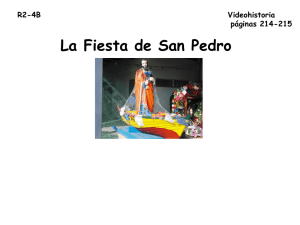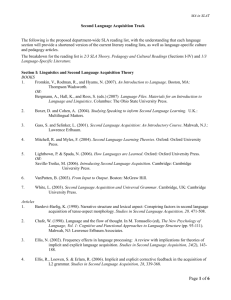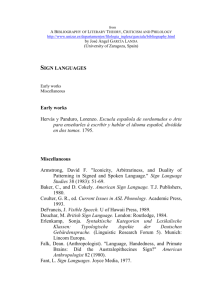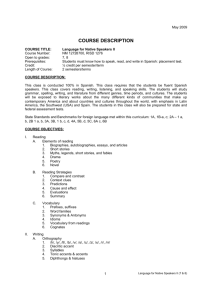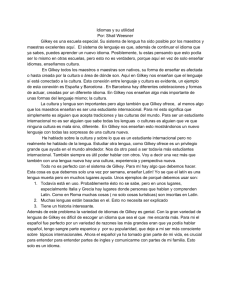Basque
advertisement
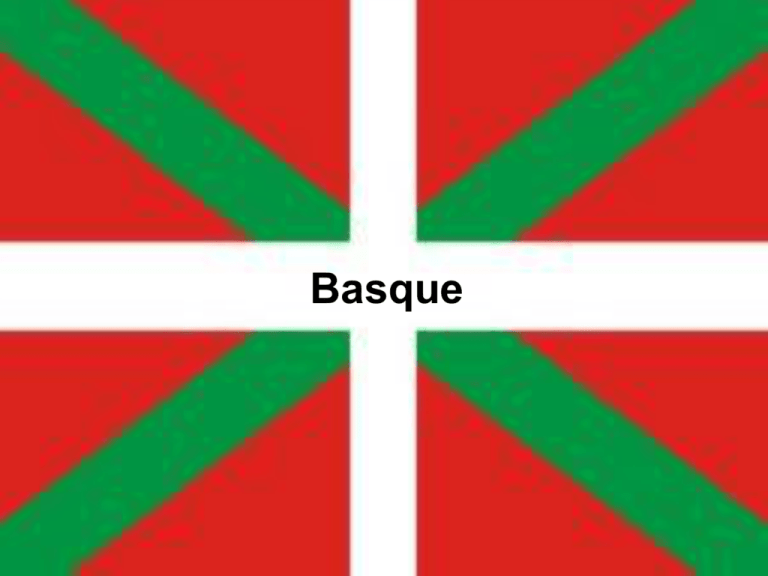
Basque Basque • History of the language and culture: 1. 2. • 3. Origins to Middle Ages Middle Ages to 1936 Brief extract of La pelota vasca Fortune of language and nationalism under Franco • Language Planning 1. Institutional arrangements following the 1978 Constitution 2. Language planning measures postFranco 3. Political history 4. Effectiveness of language planning measures 5. Future Developments History of the Basque language and culture: Origins to late Middle ages Sole survivor of pre-IndoEuropean languages of western Europe Historical knowledge starts with first arrival of Romans 1st-2nd century B.C. Resistance to assimilation Isolation Identity History of the Basque language and culture: Origins to late Middle ages Texts: First connected phrases 950 AD th century Oldest longer text is a prayer from the 14 First book 1545 Linguae vasconum primitiae New Testament translated 1571, followed by other protestant texts Religious interpretation Late appearance of dialects History of the Basque language and culture: Early modern era to 1936 Maintained relative autonomy - fueros 17th century onwards, steady flow of publications in Basque dialects, but relatively little written about Basque in Basque. 18th century onwards, lots of studies on Basque language & its origins: - 1729 first Basque grammar - 1745 trilingual Basque-Castilian-Latin dictionary - Luís Bonaparte - dialectology Carlist stronghold throughout 19th century civil wars Berpizkundea ‘Rekindling’ - Renaissance: Itz-jostaldiak History of the Basque language and culture: Early modern era to 1936 Modernisation Roots of nationalism Industralisation Emigration to urban areas Immigration from non-Basque Spain Sabino Arana y Goiri, ‘Father’ of Basque nationalism – race before language as the defining element of the nation – importance of religion 1918 Eusko Ikaskuntza / Sociedad de estudios vascos 1918 Euskaltzdaindia / Academia de la lengua vasca Primo de Rivera dictatorship 1923-1930: nationalism forced into clandestinity, so reviving importance of culture Basque social elite assimilated to Castilian culture Fortune of language and nationalism • Closure of the Basque University • Occupation by armed force of social and cultural associations • Mass burning of books in Euskera • Elimination of all use of Euskera in schools, radio broadcasts, public gatherings and in publications • Suppression of Basque cultural societies and of all magazines, periodicals and reviews in Euskera • Prohibition of the use of Euskera during the celebration of Mass and other religious ceremonies • A decree requiring the translation into Spanish of all Basque names in civil registries and official documents • The removal of inscriptions in Euskera from all tombstones and funeral markers. Fortune of language and nationalism • Demand for “Seperatism.” • Society of Basque Students (Euzko Ikasle Alkartasuna, EIA) distributed leaflets and journals. • ETA (founded on 31 July 1959-“Basque Homeland and Freedom). Fortune of language and nationalism • • • • • Graffiti Distribution of propaganda Public display of the Basque flag (Ikurriña) The destruction of Francoist architectural symbols In the 1950s, the Basque language experienced a revival through semi-clandestine Basque school called Ikastolas. • Celebration of the Basque national day (Aberri Eguna) • Illegal transmissions of radio messages by the president of the Basque government. • In addition, an international organisation for the defense and diffusion of Basque culture was founded in Leiden, Netherlands. This group met for the first time in September 1947, in French Basque territory, and decided to illegally distribute propaganda promoting the Basque language and culture in the Spanish Basque country. Fortune of language and nationalism • ETA: “Once language is lost, race could not sustain Basque identity.” Fortune of language and nationalism • Arana (founder of the Basque Nationalist Party): “If we had to choose between a province of Bizkaya populated by “maketos” (immigrants) that would only speak Basque language and a Bizkaya populated by Bizkaínos (people of Basque origin) that would only speak Castilian, we would certainly choose the latter, because the Basque substance, which can be purified when contaminated by foreign influence, is preferable to a foreign substance whose properties can never be changed.” Fortune of language and nationalism • Federico Krutvig (a member of the Academy of Basque Language and one of the most influential early ideologues of ETA): “Considering another absurd situation, I believe that a black man from the Congo, who has learnt the Basque language since he was young and who has lived among Basques, is more Basque the son of people with Basque origins (Euskaldún), and including Basque surnames, who does not know the Basque language.” • “it is more important to preserve, strengthen, and promote national traits, such as the language, than to obtain a state.” Fortune of language and nationalism • Dolores Ibárruri: • known as La Pasionaria or the Passionate One for her inspiring speeches. • Leading propagandist for the Republican side. • "!No pasarán!" (They shall not pass!) • "It is better to die on your feet than to live on your knees" Fortune of language and nationalism • Euskera under Franco: • 1937: General Franco occupies Basque country. The Basques had enjoyed a degree of autonomy which they now were denied. Franco regime ruthlessly repressed their aspirations for independence. 1959: ETA is founded with the aim of creating an independent homeland in Spain's Basque region. The full name of the organisation - Euzkadi Ta Askatasuna - means Basque fatherland and freedom. 1961: ETA's violent campaign begins with an attempt to derail train transporting politicians. 1968: ETA kills its first victim, Meliton Manzanas, a secret police chief in San Sebastian. December 1973: Basque nationalists assassinate Prime Minister Admiral Luis Carrero Blanco in Madrid in retaliation for the government's execution of Basque militants. Fortune of language and nationalism • About 30% of the 2.5 million Basque people speak it and more than 90% of Basque children are now enrolled in Euskera schools. Radio and television stations broadcast in the language. There are Basque newspapers and a growing number of internationally renowned writers, such as Bernardo Atxaga, whose works have been translated into Castillian Spanish, English, German and French. • But despite the fact that Spain's Basque country today enjoys more autonomy than any other - it has its own parliament, police force, controls education and collects its own taxes - Eta and its supporters have remained determined to push for full independence. Institutional arrangements put in place as a result of the Constitution of 1978 1978. Constitución • Ratificada en referéndum el 6 de noviembre . • Vigente desde el 29 de diciembre. • proclama su voluntad de “proteger a todos los españoles y pueblos de España en el ejercicio de los derechos humanos, sus culturas y tradiciones, lenguas e instituciones.” Artículo 3 • El castellano es la lengua española oficial del estado. Todos los españoles tienen el deber de conocerla y el derecho a usarla. • Las demás lenguas españolas serán también oficiales en las respectivas Comunidades Autónomas de acuerdo con sus Estatutos. • La riqueza de las distintas modalidades lingüísticas de España es un patrimonio cultural que será objeto de especial respeto y protección. Implicaciones: • Superación de la idea reduccionista de España basada en la uniformidad cultural y lingüística franquista. • Reconocimiento de la existencia de diversas lenguas que podrán ser cooficiales en ciertos territorios si así lo estipula el Estatuto de Autonomía pertinente. 1979 Estatuto vasco (Estatuto de Guernica) aprobado en referéndum el 25 de octubre de 1979. • Norma institucional básica española de una Comunidad Autónoma. • Comunidad Histórica (1936) Artículo 6 • El euskera, lengua propia del Pueblo Vasco, tendrá, como el castellano, carácter de lengua oficial en Euskadi, y todos sus habitantes tienen el derecho a conocer y usar ambas lenguas. • Las instituciones comunes de la Comunidad Autónoma, teniendo en cuenta la diversidad socio-lingüística del País Vasco, garantizarán el uso de ambas lenguas, regulando su carácter oficial, y arbitrarán y regularán las medidas y medios necesarios para asegurar su conocimiento. • Nadie podrá ser discriminado por razón de la lengua. • La Real Academia de la Lengua Vasca-Euskaltzaindia es institución consultiva oficial en lo referente al euskera. • Por ser el euskera patrimonio de otros territorios vascos y comunidades, además de los vínculos y correspondencia que mantengan las instituciones académicas y culturales, la Comunidad Autónoma del País Vasco podrá solicitar del Gobierno español que celebre y presente, en su caso, a las Cortes Generales, para su autorización, los tratados o convenios que permitan el establecimiento de relaciones culturales con los Estados donde se integran o residan aquellos territorios y comunidades, a fin de salvaguardar y fomentar el euskera. 1982 • Ley de Normalización y Uso del Euskera. • Se crea la Radio Televisión Vasca. • Ley Orgánica de Reintegración y Amejoramiento del Régimen Foral de Navarra (LOREAFNA). Ley de Normalización y Uso del Euskera. • Artículo 5. 1. Todos los ciudadanos del País Vasco tienen derecho a conocer y usar las lenguas oficiales, tanto oralmente como por escrito. 2. Se reconocen a los ciudadanos del País Vasco los siguientes derechos lingüísticos fundamentales: • Derecho a relacionarse en euskera o en castellano oralmente y/o por escrito con la Administración y con cualquier Organismo o Entidad radicado en la Comunidad Autónoma. • Derecho a recibir la enseñanza en ambas lenguas oficiales. • Derecho a recibir en euskera publicaciones periódicas, programaciones de radio y televisión y de otros medios de comunicación. • Derecho a desarrollar actividades profesionales, laborales, políticas y sindicales en euskera. • Derecho a expresarse en euskera en cualquier reunión. 3. Los poderes públicos garantizarán el ejercicio de estos derechos, en el ámbito territorial de la Comunidad Autónoma, a fin de que sean efectivos y reales. LOREAFNA Artículo 9: • El castellano es la lengua oficial de toda la Comunidad Foral. • El vascuence será lengua oficial “en las zonas vascoparlantes de Navarra”. • Se encomienda a una ley foral la determinación de las zonas, regular el uso oficial de la lengua y ordenar su enseñanza “en el marco de la legislación general de Estado”. Implicaciones • No se alude a ninguna lengua como propia. • Lengua como medio de comunicación. • Oficialidad territorial total para el castellano y parcial para el euskera. • Consolidación de diglosia. • Reducción del compromiso institucional en la promoción de su conocimiento y su uso social y oficial. 1983 • Se regulan los modelos de enseñanza bilingüe en la enseñanza no universitaria de la Comunidad Autónoma Vasca. • Se crea la Secretaría General de Política Lingüística del Gobierno Vasco. 1986 Ley Foral del Vascuence en Navarra. • Objetivos • División territorial en tres zonas. • Se establece que la institución consultiva oficial, a los efectos del establecimiento de las normas lingüísticas, será la Real Academia de la Lengua Vasca (Art 3). Objetivos • Amparar el derecho de los ciudadanos a conocer y usar el vascuence y definir los instrumentos para hacerlo efectivo. • Proteger la recuperación y el desarrollo del vascuence en Navarra, señalando las medidas necesarias para el fomento de su uso. • Garantizar el uso y la enseñanza del vascuence con arreglo a principios de voluntariedad, gradualidad y respeto, de acuerdo con la realidad sociolingüística de Navarra. Zonas Zona vascófona: al euskera es cooficial y se le confiere un estatus amplio en uso y aprendizaje. zona mixta: el euskera no es oficial aunque goza de cierto grado de protección y fomento. zona no vascófona: no se prevén medidas de fomento. 1988 • Se crea la Dirección General de Política Lingüística del Gobierno de Navarra. • Se aprueban los modelos de enseñanza bilingüe en Navarra. Dirección General de Política Lingüística de Navarra • Servicios: el de Normalización y Fomento del Euskera y el de Programación e Investigación. • Cometidos: fomento de la normalización lingüística en la vida social, fomento del uso del euskera en los medios de comunicación, la promoción de actividades culturales y el fomento de la creación literaria así como de la traducción de la producida en otros idiomas. • 1989. Se aprueba el plan de normalización lingüística de las administraciones públicas de la Comunidad Autónoma Vasca. • 1998. Se aprueba en Consejo de Gobierno El Plan General de Promoción del Uso del Euskera. • 2004-2007. Plan General de Promoción del Uso del Euskera. • 2008. El Consejo de Gobierno aprobó el Plan de Uso del Gobierno Vasco el 1 de julio de 2008. Language planning measures • Spanish Constitution (1978) and the Basque Statute of Autonomy (1979) set the basis for the reorganisation and regeneration of the Basque language. • Normalisation Law 1982 – ‘objective to make Basque commonplace at all levels of society’ – Public Administration – articles 6 – 14 – Education – Articles 15 – 21 Language planning measures • Between 1983 and 1992 12 laws were passed in order to further underline the 1982 Normalisation Law in the education system. These were; • 1983: The Decree of Bilingualism, Order of Bilingualism • 1985: Order to regulate Basque teaching • 1988: Law to subsidise Ikastolas (Basque schools) • 1989: Law to regulate Basque teaching, • Law to regulate Language Profiles Language planning measures • 1990: Law to create Centres to strengthen Basque, • Law to Regulate Centres to strengthen Basque • 1991: Law to develop Centres for Basque, • Law to Regulate Centres for Basque • 1992: Law to establish pre-school curriculum • Law to establish Primary School Curriculum. Language planning measures • Basque Teaching models Type Description X Education entirely in Spanish (exempted students + subject to phasing out) A Education in Spanish with Basque as a compulsory Subject B Education partly in Basque, partly in Spanish D Education in Basque with Spanish as a compulsory subject Language planning measures • - Academy of Basque language 1918 • - Real Academy of Basque Language, after the death of Franco. • - Basque Institute for Public Admin ‘(IVAP) in July 1983 Language planning measures • The most influential steps to the changing of the status of the Basque Language were:[1] 1. Approval of the Statute of Autonomy of the Basque Country, December 18th 1979. 2. Creation of the Executive Power base of the Basque Government and Basque Parliament, 1980 3. Creation of the Advisory Council of the Basque Language, January 11th 1982 4. Approval of the Normalisation Law of the Basque Language, November 24th 1983 [1] J. Cobarrubias, History of the “Normalization” of Basque in the Public Administration Sphere, New Jersey. Language planning measures • The most influential steps to the changing of the status of the Basque Language were [cont]: 5. Creation of the Secretariat of Language Policy, January 17th 1983 Decree of the Department of Education and Culture regulating the use of both official languages in Education excluding Higher Education, July 11th 1983 Creation of the Basque Institute for Public Admin (IVAP) `July 27th 1983 Creation of Adult Literacy and Basquisation (HABE) November 25th 1983 Approval of Statutes of the University of the Basque Country March 18th 1985. 6. 7. 8. 9. Political history • Arana’s creation of PNV – Partido Nacionalista Vasco – 1897 • Building of support – late 19th, early 20th century • “Congenital fragmentation of Basque nationalism” • Status under Second Republic Political history • Francoist repression and development of ETA (Euskadi ‘ta Askatasuna – Basque Land and Freedom) • Transición democrática – Statute of Autonomy • Dominance of PNV in post-Franco Basque Country Political history • Ley de Partidos 2002 • Herri Batasuna, Euskal Herritarrok, Batasuna – 2003 • Further parties made illegal in 2008-9 • No participation of radical nationalist parties in 2009 elections • Plan Ibarretxe Political history March 1st, 2009 Election Results - Euskadi Totals Registered Electors 1,776,059 Voters 1,148,697 64.7% 100,939 8.8% 1,047,758 91.2% 11,562 1.1% Invalid Ballots Valid Votes Blank Ballots Ticket Votes % Seats Euzko Alderdi Jeltzalea-Partido Nacionalista Vasco (EAJ-PNV) 399,600 38.1 30 Partido Socialista de Euskadi-Euskadiko Ezkerra (PSE-EE/PSOE) 318,112 30.4 25 Partido Popular (PP) 146,148 13.9 13 Aralar 62,514 6.0 4 Eusko Alkartasuna (EA) 38,198 3.6 1 Ezker Batua-Berdeak (EB-B) 36,373 3.5 1 Unión Progreso y Democracia (UPyD) 22,233 2.1 1 Others 13,018 1.2 0 March 9, 2008 General Election Results - Spain Totals Registered Electors 35,073,179 Voters 25,900,442 Invalid Ballots 165,576 Valid Votes 25,734,866 Blank Ballots 286,182 Ticket Votes 73.8% % Seats 11,289,335 43.9 169 Partido Popular (PP) 10,278,010 39.9 154 Convergència i Unió (CiU) 779,425 3.0 10 Euzko Alderdi JeltzaleaPartido Nacionalista Vasco (EAJ-PNV) 306,128 1.2 6 Esquerra Republicana Catalunya (ERC) 298,139 1.2 3 969,946 3.8 2 Bloque Nacionalista Galego (BNG) 212,543 0.8 2 Coalición Canaria - Partido Nacionalista Canario (CC-PNC) 174,629 0.7 2 306,079 1.2 1 Nafarroa Bai (Na-Bai) 62,398 0.2 1 Eusko Alkartasuna (EA) 50,371 0.2 0 Chunta Aragonesista (ChA) 38,202 0.1 0 Others 683,479 2.7 0 Partido Socialista Obrero Español (PSOE) de Izquierda Unida (IU) Unión Progreso Democracia (UPyD) y IV ENCUESTA SOCIOLINGÜÍSTICA, 2006 Consejería de Cultura del Gobierno Vasco Viceconsejería de Política Lingüística del Gobierno Vasco Fuente: IV Encuesta Sociolingüística. Viceconsejería de Política Lingüística. Gobierno Vasco, 2006 Población de más de 16 años en la Comunidad Autónoma Vasca (1.850.000) Monolingües erdaldunes ("que hablan distinto del vasco") 18.3 30.1 51.5 Bilingües (hablan bien euskera y castellano) Bilingües pasivos (entienden euskera pero no lo hablan bien) Por provincias… BIZKAIA (994.000 hab.) Monolingües GIPUZKOA Bilingües (594.000 hab.) Bilingües pasivos ÁLAVA (261.000 hab.) Evolución del bilingüismo (19912006) Gure hitzak Esan berriz esan Ez daitezela ahaztu Ez daitezela gal, Elur gainean Txori anka arinek Utzitako arrasto sail Ederra bezalaxe Repitamos una y otra vez las palabras nuestras: que no se olviden, que no se pierdan como las marcas que los ligeros pies de los pájaros dejan sobre la nieve Txoritua norat hua Bi hegalez airian Pájaro querido, ¿adónde vas volando con tus alas en el aire? Zer dio isiltzan denak Isiltzen denean? ¿Qué dice el que calla cuando calla? Mikel Laboa – Gure hitzak "Para mí la lengua no tiene que ver con la política, está más allá, es en todo caso una poética, forma parte de mi instalación en el mundo". Bernardo Atxaga Bibliography • Clark, R.P. (1979) The Basques: The Franco Years and Beyond. United States of America: University of Nevada Press. • Conversi, D. (1997) The Basques, the Catalans and Spain: Alternative Routes to Nationalist Mobilisation. United Kingdom: C. Hurst & Co. Ltd. • Medrano, J. D. (1995) Divided Nations: Class, Politics, and Nationalism in the Basque Country and Catalonia. United States of America: Cornell University Press • Sullivan, J. (1988) ETA and Basque Nationalism. London and New York: Routledge. • Tovar, A. (1950) La Lengua Vasca. Spain: Biblioteca vascongada de los amigos del país • Trask, R.L. (1997) The History of Basque. New York: Routledge Bibliography • http://www.bbc.co.uk/news/world-europe-11183574 (03/11/10) • http://www.bbc.co.uk/news/world-europe-11183574 (08/11/10) • http://electionresources.org/es/index_en.html (08/11/10) • http://electionresources.org/es/eus/index_en.html (08/11/10) • http://www.elmundo.es/eta/index.html (08/11/10) • http://www.elmundo.es/elmundo/2004/12/30/espana/1104396 043.html (08/11/10) • http://www.raceandhistory.com/worldhotspots/basque.htm (11/11/10) • http://www.answers.com/topic/dolores-ib-rruri (11/11/10) • http://www.euskara.euskadi.net/r59738/es/contenidos/libro/iv_inkesta_soziol/es_ink/adjuntos/IVIn kesta(GAZT).pdf (11/11/10)
